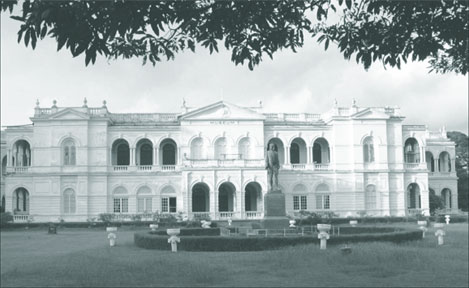The museum, its value in the context of education
By Amal Hewavissenti
The international museum day fell on May 18 this year. Contextually
it is important to examine the clear evidence about the role of the
museum in broadening new horizons in education.
 In all respects, the museum is a mirror that presents a panorama of a
country's cultural heritage and preserves it for future generations. In all respects, the museum is a mirror that presents a panorama of a
country's cultural heritage and preserves it for future generations.
Thus, it assumes the role of a storehouse that appropriately collects
the remnants of the legacy of the past and reshapes public attitude to
culture and the nation as a whole.
In whatever way, the museum ranks high on the public opinion as far
as education is concerned and its popularity has been mounting up by
leaps and bounds since 1960s. The artefacts and items which a museum
houses, illustrate the varied phases in the anthropological evolution
and they do a lot to assess man's life styles, patterns of thinking and
aesthetic trends in the past.
Earlier, the museum was viewed as the sole place to safeguard
specimens related to man's cultural heritage and natural heritage.
Currently it has broadened its capacity as a unique institution that
inevitably promotes society and its development.
Museum
The English word 'museum' is of old Greek derivation meaning
"Mouseion" the temple of the Goddess 'Museus' who was believed to fuel
inspiration for art, music and poetry. Accordingly, the museum is
literally a non-profit making institution which is solely meant for the
welfare of society and is constantly open for public education and
entertainment.
Currently museum has become immensely popular owing to the massive
development of tourism, fresh alterations in school education and the
wide publicity offered by electronic media such as the television.
A survey carried out in 1970 reveals that 25 million people in
England alone had attended museums for educational and entertainment
purposes.
Apart from that a research conducted by the Tourist Board of England
in 1981, showed that 24 percent of the adults in England had watched
museums in the same year excluding the huge number of students of
schools.
The most basic function of the museum involves bringing together the
enormous range of collectable objects and items related to the heritage
of the past and present.
It is important that these items are collected and arranged under
different themes and subjects strictly in keeping with the prime
objectives of the museum.
This is meant for the convenience for research in the offing.
The museum is primarily responsible for the perfect safety of the
items which may be plundered by curio-hunters or damaged by natural
destructive factors.
Moreover, the museum's curatorial team is responsible for conserving
and maintaining the items by means of scientific and technological
methods. This is also a very important function in the museum.
It is invariably a treasure trove of information. The curatorial team
and intellectuals deeply study the artefacts and items uncovered in
archaeological research and record the data in special publications kept
mainly in display in the publications department.
It thus keeps artefacts and items in display for the public, for
enthusiastic researchers and for the school children in a way that
creates an atmosphere of education, entertainment and curiosity in an
unknown world.
The heart of a museum is the priceless collection of artefacts and
items which it keeps and almost all functions centre on them. This
collection of works of art and historical items unconditionally
represent the building as an educationally valuable centre of
information. All functions such as registering, conservation,
protection, exhibition for research purposes are carried out to
facilitate education.
Any student could fall back on the records, items and works of art
displayed by the museum in his exclusive study of any subject.
Curios
For instance, a student interested in studying the history and
evolution of bronze statues in Sri Lanka may be confronted with the
challenge of travelling to various places in search of locations of
bronze statues.
Yet he can conveniently complete his study by using all sources of
information, statues, photographs under one roof if he visits a museum.
Unless all these had been safeguarded in a museum, the student would
have been compelled to travel to various places in the country and to
take up several years to complete his study project.
The network of museums in Sri Lanka possesses curios, works of art
and historical items that speak volumes for a proud heritage going back
to 2,500 years or more. The prehistoric human and animal remains, stone
tools, stone carvings, bronze statues, wood carvings, valuable ola leaf
books, coins, which can be seen nowhere else, are on display in the
museum.
However, projects are under way to launch public awareness programs
in remote areas and stage mobile exhibitions of educational and cultural
interest. The whole network of museums in Sri Lanka is a
multi-educational service. It appears fair to say that the museum stays
ready to provide academic and social education for all representing
institutions from kindergarten to university level.
The museum's role in education has been shaped by the current
educational methodology in practice in Sri Lanka. Some museums
(Ratnapura) launch educational program both for teachers and students in
order to make the museum as familiar a place of education as the school
itself.
The curatorial team adopts measures to organise the educational
programs to the taste and intelligence level of the visitors. It is
opportune for museum education to be included in national educational
stream because museums abound in valuable data indispensable for
different levels and branches of study. |


